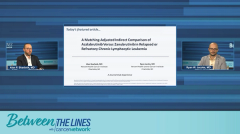
Relapsed/Refractory CLL: Overview of the Treatment Landscape
A Matching-Adjusted Indirect Comparison of Acalabrutinib Versus Zanubrutinib in Relapsed or Refractory Chronic Lymphocytic Leukemia
Episodes in this series

Transcript:
Alan P. Skarbnik, MD: Hello. Welcome to Between the Lines. I'm Dr. Allen Skarbnik, the director of the Lymphoma CLL [Chronic Lymphocytic Leukemia] program at Novant Health Cancer Institute in Charlotte, North Carolina.
Ryan W. Jacobs, MD: And I'm Ryan Jacobs. I am the director of the Lymphoma division at the Levine Cancer Institute, also in Charlotte, North Carolina.
Alan P. Skarbnik, MD: Today, we're going to talk about a new article that was just presented in a couple of international conferences for hematology and oncology. It's a matching-adjusted indirect comparison of acalabrutinib versus zanubrutinib in relapsed/refractory chronic lymphocytic leukemia. We're focusing today on relapsed/refractory chronic lymphocytic leukemia, and when we choose a treatment for these patients, there are a number of things we think about. What type of patient with relapsed/refractory CLL do you see in your practice?
Ryan W. Jacobs, MD: I think a few years ago it was mostly patients that had chemotherapy in their past, and now we're seeing a mix of some of those patients. More and more, it's going to be the patients that are usually older and have seen {at least] one of the novel treatments.
Alan P. Skarbnik, MD: Unfortunately, what I've noticed with that transition is that we have less patients with relapsed disease than we used to have before. Less volume.
Ryan W. Jacobs, MD: Certainly. Our new treatments are so effective.
Alan P. Skarbnik, MD: That's a good thing. As we know, patients may present in several different ways like in the frontline setting. It is a bit more enriched for higher-risk disease, of course, because patients who are exposed to these novel agents, as we know, can do well. The patients who have relapsed post novel agent can have higher-risk disease, but we still see patients with low rate- low-risk cytogenetic abnormalities that may be less prevalent in the population. We need to take those things into consideration when we treat those patients, and as you said, age, comorbidities, other medications. What's your general approach to treating relapsed/refractory CLL?
Ryan W. Jacobs, MD: I think that depends so much on what they've received for treatment before. If it happens to be one of those patients that has seen only chemotherapy in their past, the discussion is much the same as I would [have with] a treatment-naive patient in our current era, where I'm just discussing Bruton’s Tyrosine Kinase [BTK] inhibitor, indefinite treatment versus a more time-defined approach with venetoclax-based therapy, usually with obinutuzumab, as a pair. The question gets a little more interesting when a patient has already had one of our novel treatments and, particularly, if they had venetoclax first line and maybe just got it for a year. With that approval being a few years old now, we're starting to see some of these patients relapse. Do we retreat with venetoclax? Do we switch them over to a Bruton’s Tyrosine Kinase inhibitor? On the other side of it, if it's a patient who's on, for example, acalabrutinib, and we're starting to see signs of progression, do we switch treatment right away? I think the easier option at this point is to move them to venetoclax, but do we wait for clinical progression on a patient who’s on an indefinite treatment? So, there are still some questions.
Alan P. Skarbnik, MD: Those are very important questions. Sequencing is one of the questions we debate the most when we talk about these things. It's good to have options. So, focusing on BTK inhibitors in relapsed/refractory CLL, how are clinical factors such as performance status, comorbidities, genetic mutations impact your treatment selection?
Ryan W. Jacobs, MD: So, from a standpoint of most clinical factors and mutations, I think with Bruton’s Tyrosine Kinase inhibitors, they're just so effective across the spectrum that it's almost the easiest one to navigate if you think that BTK is the best treatment, there are only a select few things that would make me decide otherwise. But, focusing on the prognostic workup, it's really one in particular that we know is effective across most all of the prognostic subgroup classifications and even the highest-risk patients with chromosome 17 aberrations really still seem to do quite well with indefinite BTK inhibition.
Alan P. Skarbnik, MD: I share the vision completely. I prefer giving long-term treatment for those high-risk patients as well. So, we have 3 approved options of BTK inhibitors for CLL, 3 covalent BTK inhibitors. How do you differentiate them? Are you looking into efficacy or safety profile? How does that impact your treatment selection for those patients who are going to one of those drugs?
Ryan W. Jacobs, MD: I think the easiest comparisons because we have direct head-to-head studies, are going to be between ibrutinib and acalabrutinib, and ibrutinib and now zanubrutinib. Separately, both studies showed favorable toxicity profiles with the comparison in the relapsed setting. In reaction to that and some other factors, now the NCCN [National Comprehensive Cancer Network] tells us that ibrutinib is not one of the preferred regimens, so we are focusing mostly on prescribing acalabrutinib or zanubrutinib when we've decided that a BTK inhibitor is the right treatment for a patient. We're now getting some information on how to choose between those two options. We probably won't ever get a definitive prospective study that will give us the 'right answer'. But it is helpful now, as more data comes out, that we can compare trials and help navigate those decisions.
Transcript edited for clarity.
Newsletter
Stay up to date on recent advances in the multidisciplinary approach to cancer.






































